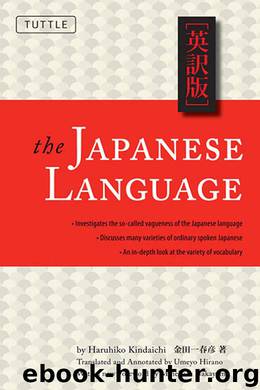The Japanese Language by Haruhiko Kindaichi

Author:Haruhiko Kindaichi
Language: eng
Format: mobi, epub
ISBN: 9784805310809
Publisher: Tuttle Publishing
Published: 2013-03-22T05:03:19+00:00
Favorite words
Lastly, each country has its own favorite words. According to Sasaki Tatsu, a scholar of English, the Japanese are fond of using the word kokugo and, indeed, even primary school pupils are familiar with it.4 Its English translation would be “the national language.” This expression is said to be used in England only on special occasions. A book in which it appears is most likely to be a very diffcult one written for specialists. The word kokugo is doubtless an expression of the Japanese psychology that makes a strict distinction between Japanese things and foreign things.
Fukuda Tsuneari says in Nihon oyobi Nihonjin (Japan and the Japanese): “To a Japanese, white people are white people before they are individuals like Mary or François. Similarly, we Japanese are Japanese before we are individuals like Tar or Hanako.”5 The existence of words like kokushi (Japanese history), hgaku (Japanese music), and wafuku (Japanese clothes) is one indication of our feeling that distinctions should be made between Japanese and foreign things.* The writing of foreign words in stiff katakana to distinguish them from other words as if they were objects of our enmity, is an expression of that same feeling.
Before the war, an exercise program on the radio began with: Zenkoku no minasan, ohay gozaimasu! (People of the entire nation, good morning!). One story has it that a foreigner wondered why they used the term zenkoku no (of the whole country) every day. Zenkoku is surely one of our favorite words.
When General MacArthur came to Japan after the war and spoke on the radio to the American occupation offcers and men, it was interesting that his first word was: “Boys!” Had it been a Japanese offcer in command, what would he have said? Most likely he would have addressed them: Chy mus no waga kokugun no shhei ni tsugu . . . (To the peerlessly loyal and brave offcers and men of our nation’s army . . .).
In short, the Japanese are very fond of the word koku (country) and its compounds. This is probably similar to the fondness in the United States for using the word “world.” The United States championship baseball playoff is referred to there as the World Series, but the Japanese, even assuming there were no better players in other countries and they were aware of it, would probably not call an all-Japan judo tournament a “world tournament.”
In the chapters that follow, I will examine the special characteristics of the Japanese vocabulary.
Footnotes
*The koku and h mean “country”; when used as prefixes they mean “Japan.” Wa is a name for Japan.
Download
This site does not store any files on its server. We only index and link to content provided by other sites. Please contact the content providers to delete copyright contents if any and email us, we'll remove relevant links or contents immediately.
| Africa | Americas |
| Arctic & Antarctica | Asia |
| Australia & Oceania | Europe |
| Middle East | Russia |
| United States | World |
| Ancient Civilizations | Military |
| Historical Study & Educational Resources |
The Rape of Nanking by Iris Chang(3518)
The Sympathizer by Viet Thanh Nguyen(3500)
World without end by Ken Follett(3009)
Ants Among Elephants by Sujatha Gidla(2927)
Blood and Sand by Alex Von Tunzelmann(2610)
Japanese Design by Patricia J. Graham(2559)
City of Djinns: a year in Delhi by William Dalrymple(2138)
Inglorious Empire by Shashi Tharoor(2103)
In Order to Live: A North Korean Girl's Journey to Freedom by Yeonmi Park(2059)
Foreign Devils on the Silk Road: The Search for the Lost Treasures of Central Asia by Peter Hopkirk(2057)
Tokyo by Rob Goss(2021)
India's biggest cover-up by Dhar Anuj(1988)
India's Ancient Past by R.S. Sharma(1988)
The Great Game: On Secret Service in High Asia by Peter Hopkirk(1962)
Tokyo Geek's Guide: Manga, Anime, Gaming, Cosplay, Toys, Idols & More - The Ultimate Guide to Japan's Otaku Culture by Simone Gianni(1949)
Goodbye Madame Butterfly(1937)
The Queen of Nothing by Holly Black(1758)
Living Silence in Burma by Christina Fink(1732)
Batik by Rudolf Smend(1723)
